The Power of Men’s Skincare: Our Best Anti-Aging Cream for Men
What is the best anti-aging cream for men? Are you a man over 40 who’s starting to notice a few wrinkles and realizing that you’re not getting any younger? If so, you may consider a wrinkle cream to help maintain a youthful appearance. But let’s face it, most skin products seem to be marketed towards women, so you may wonder if there’s anything specifically designed for men. The good news is that there are plenty of great anti-aging creams for men today.
Now, I’m not saying that any cream will make you look like a younger, “Instagram-filtered” version of yourself, but with the right product used regularly, you can undoubtedly make a lasting difference in the appearance of your skin. In this article, we’ll share our top picks for the best anti-aging creams for men and some helpful tips for choosing the right product and getting the most out of it. So, keep reading to discover how to turn the clock back and achieve a more youthful, radiant look.
| *Must Haves in an Anti-Aging Cream* |
| Retinoids: are vitamin A derivatives that can help reduce the appearance of fine lines and wrinkles by increasing collagen production and promoting cell turnover. Retinoids are available in prescription-strength products, as well as over-the-counter creams. |
| Peptides: are small proteins that can help stimulate collagen production and improve skin elasticity, reducing wrinkles’ appearance. Peptides are often found in anti-aging creams and serums. |
| Vitamin C: This antioxidant can help protect skin from environmental damage and stimulate collagen production, reducing wrinkles and improving skin texture. Vitamin C is often found in anti-aging serums. |
| Hyaluronic acid (HA): This naturally occurring substance in the skin can help hydrate and plump the skin, reducing the appearance of fine lines and wrinkles. Hyaluronic acid is often found in moisturizers and serums. |
| Alpha-hydroxy acids (AHAs): These are acids derived from fruits and milk that can help exfoliate the skin and improve skin texture, which can reduce the appearance of fine lines and wrinkles. AHAs are often found in anti-aging creams and serums. |
Anti-aging Ingredients Check List
| *Product* | Retinoids | Peptides | Vitamin C | Hyaluronic acid (HA) | Alpha-hydroxy acids (AHAs) |
|---|---|---|---|---|---|
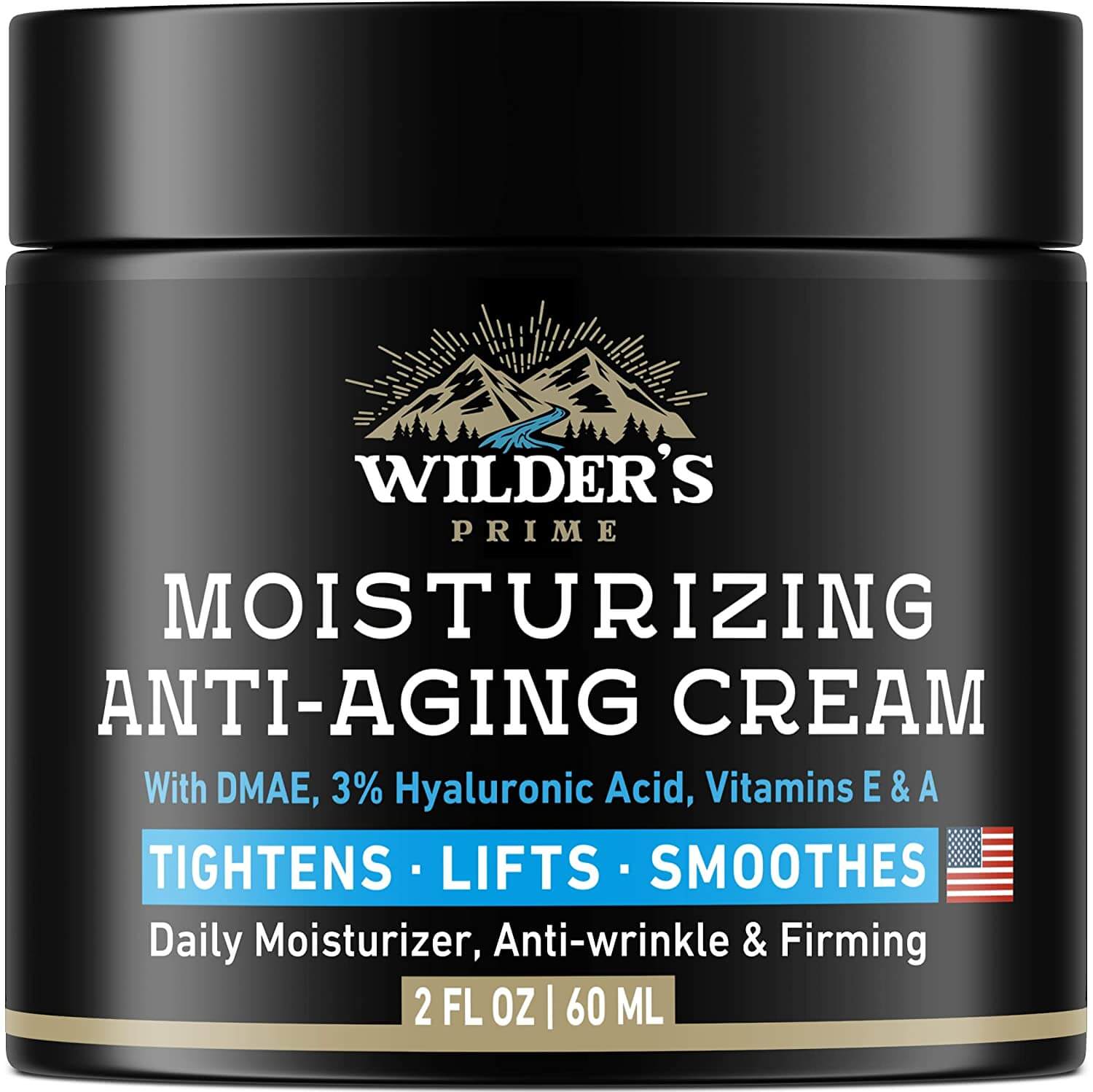 | YES | YES | YES | YES | NO |
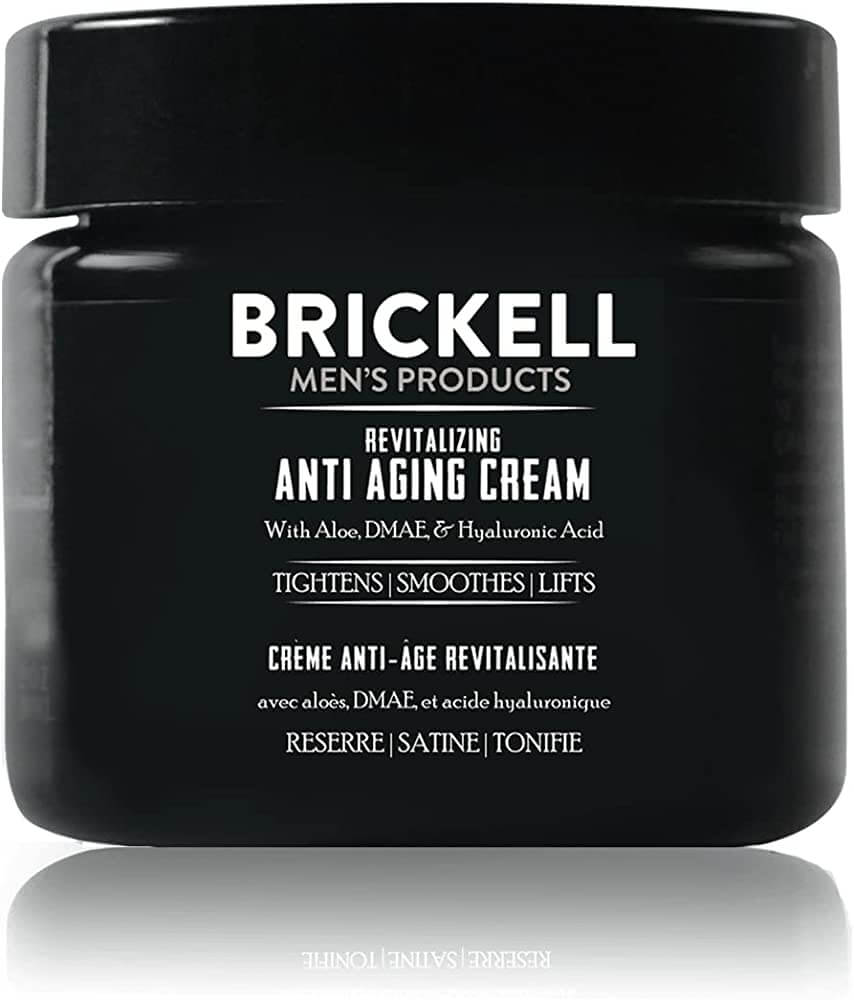 | NO | YES | YES | YES | YES |
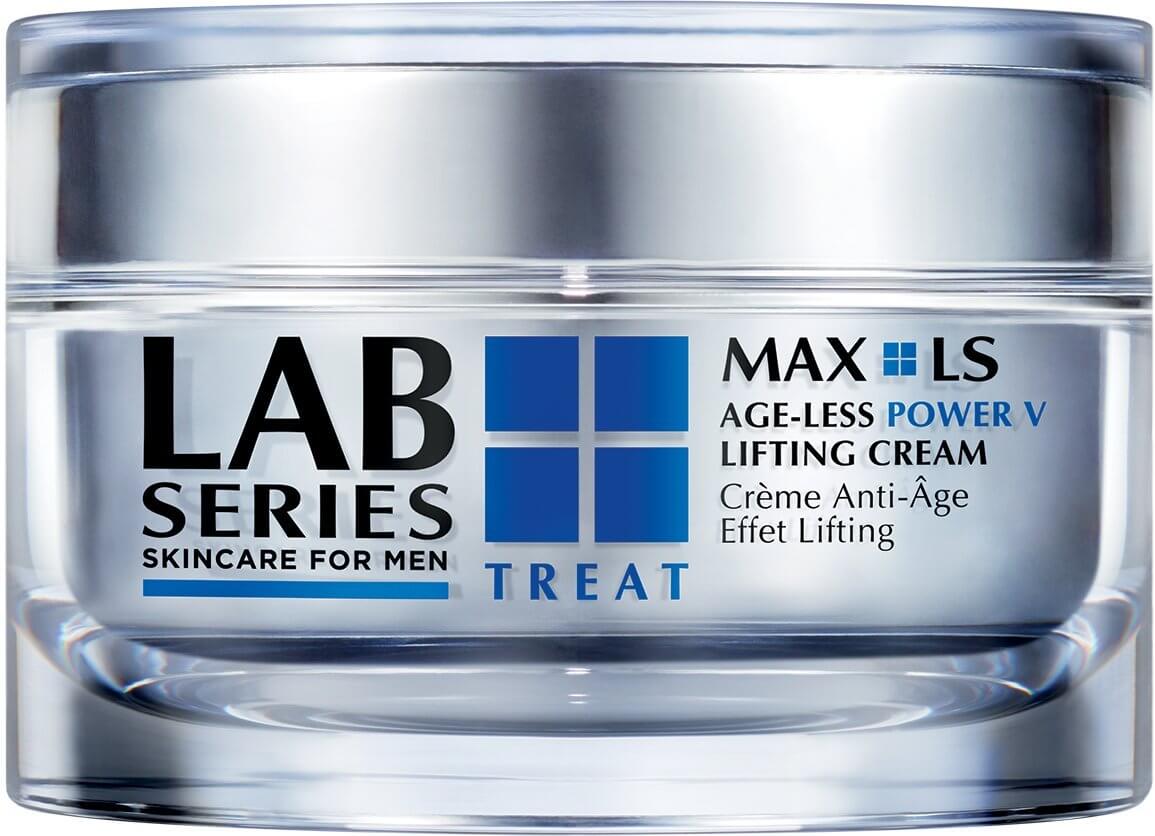 | NO | YES | YES | YES | NO |
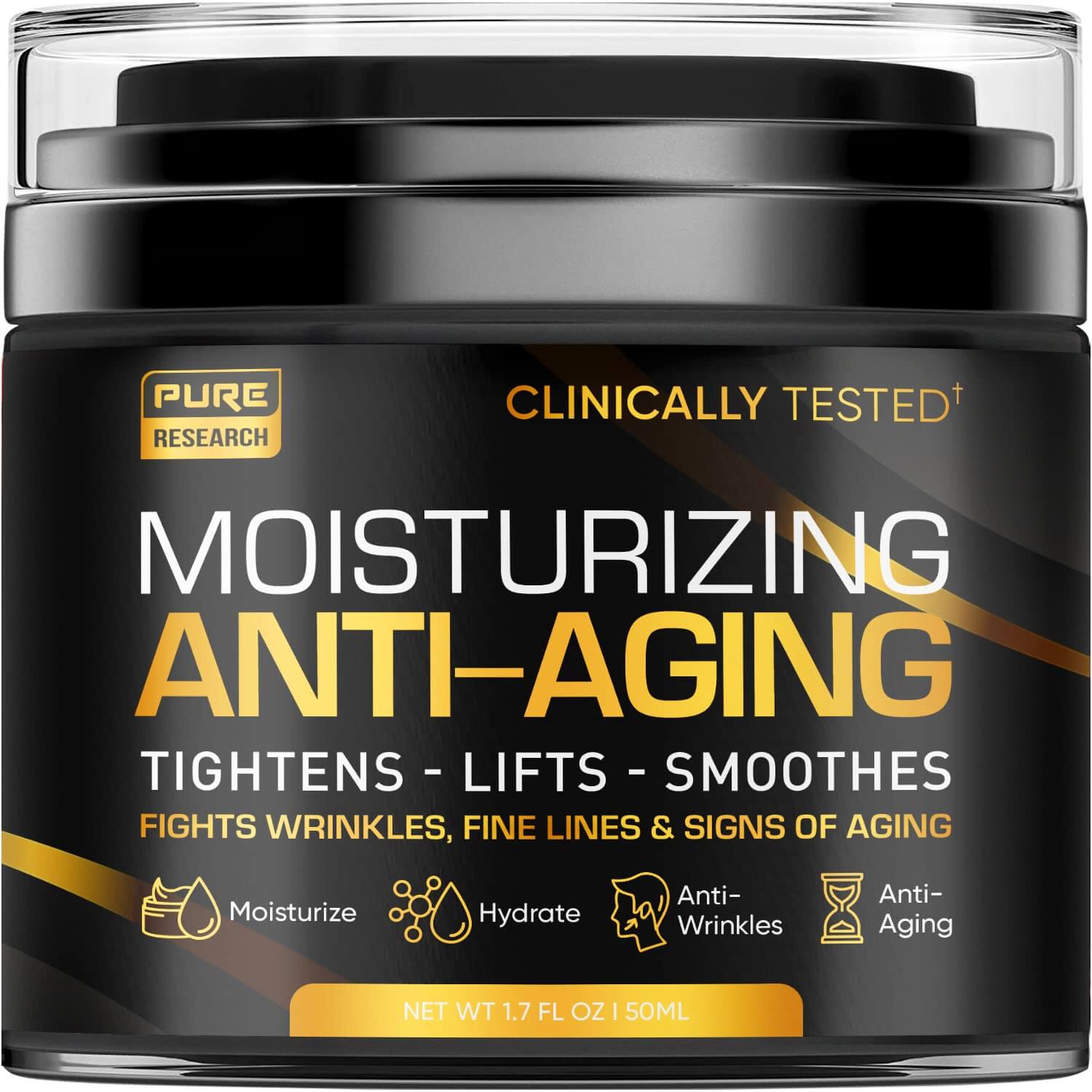 | NO | YES | NO | YES | YES |
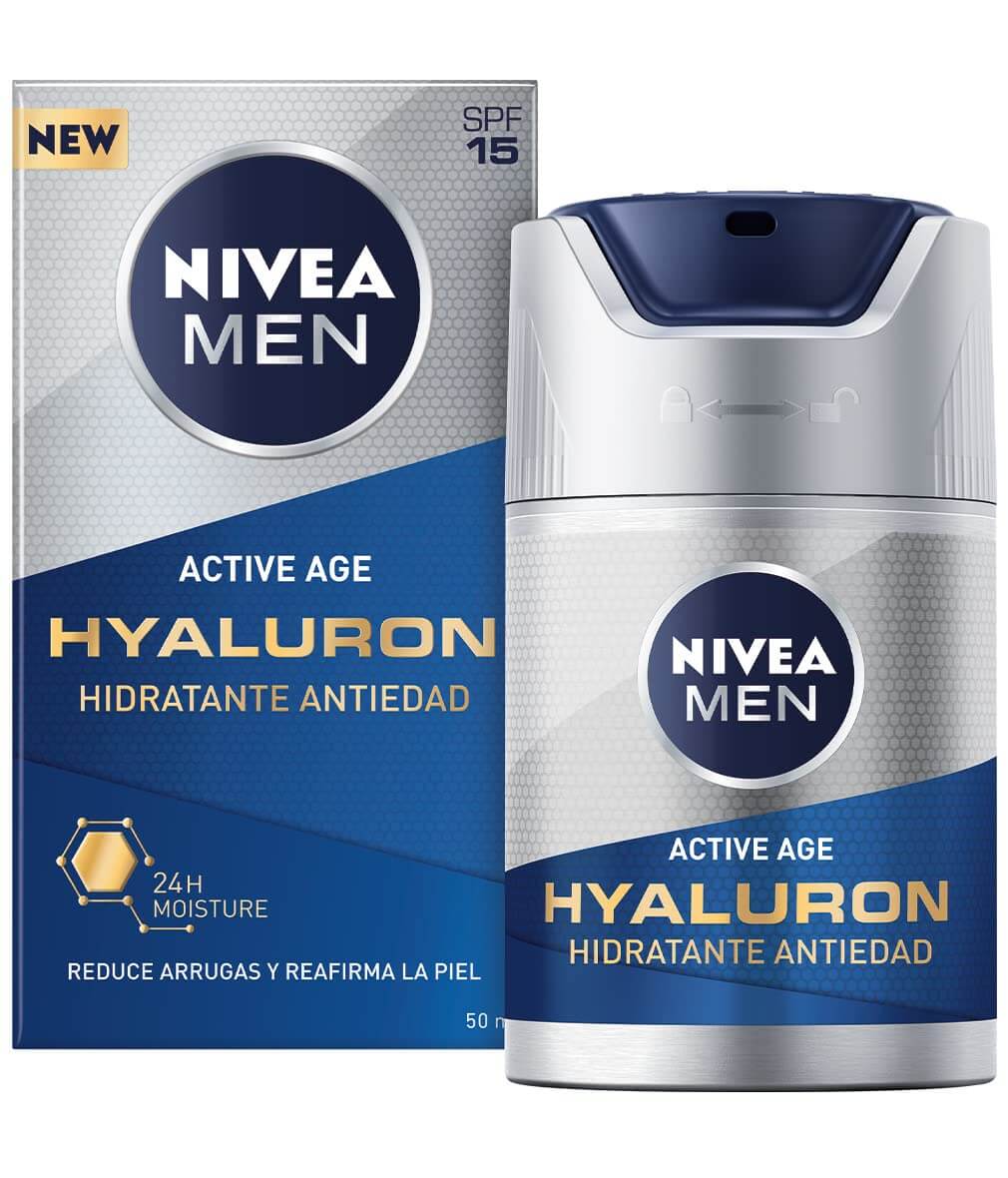 | NO | NO | NO | YES | NO |
What to Avoid in Anti-aging Cream
- Artificial fragrances: They can irritate the skin and cause allergic reactions.
- Parabens: These are preservatives that can disrupt hormone function and potentially cause health problems.
- Mineral oil: It can clog pores and cause breakouts, so it’s best to avoid it.
- Alcohol: It can dry and irritate the skin, so limiting its use is best.
- Sodium lauryl sulfate Is a harsh and drying foaming agent, especially for sensitive skin.
- Synthetic dyes: These can cause allergic reactions and irritation.
- Silicones: They can clog pores and cause breakouts, so it’s best to avoid them.
Top 5 Anti-Aging Creams for Men
| PROS | CONS |
|---|---|
| It contains a powerful blend of retinol, peptides, and hyaluronic acid to reduce the appearance of fine lines and wrinkles. | Retinol content may cause sensitivity for some users |
| Lightweight and non-greasy formula that absorbs quickly into the skin | Higher price point than some other anti-aging creams on the market |
| Suitable for all skin types, including sensitive skin | It may not provide enough hydration for those with dehydrated skin |
| Free of parabens, sulfates, and artificial fragrances | |
| Stimulates Collagen production | |
| Made with natural and organic ingredients |
| PROS | CONS |
|---|---|
| It contains natural and organic ingredients, including aloe vera and green tea, to soothe and nourish sensitive skin. | It may not be potent enough for those with deep wrinkles or severe signs of aging. |
| Free of parabens, sulfates, and synthetic fragrances | Higher price point than some other sensitive skin products on the market |
| Lightweight and non-greasy formula that absorbs quickly into the skin | |
| Hydrates and moisturizes without clogging pores. | |
| Suitable for all skin types, including combination and oily skin |
| PROS | CONS |
|---|---|
| It contains powerful anti-aging ingredients, including retinol, peptides, and hyaluronic acid. | Higher price point than some other nighttime anti-aging creams on the market |
| Specifically formulated for use at night to promote cell turnover and collagen production. | Retinol content may cause sensitivity for some users |
| Lightweight and non-greasy formula that absorbs quickly into the skin | It may not provide enough hydration for those with very dry skin |
| Suitable for all skin types, including sensitive skin | |
| Free of parabens and sulfates |
| PROS | CONS |
|---|---|
| It contains a powerful blend of retinol, hyaluronic acid, and vitamin C to reduce the appearance of fine lines and wrinkles. | It may not provide enough hydration for those with very dry skin. |
| Lightweight and non-greasy formula that absorbs quickly into the skin | Retinol content may cause sensitivity for some users |
| Suitable for all skin types, including sensitive skin | Higher price point than some other anti-aging creams on the market |
| Free of parabens, sulfates, and artificial fragrances | |
| Made with natural and organic ingredients |
| PROS | CONS |
|---|---|
| It contains a blend of antioxidants, including vitamin E and coenzyme Q10, to reduce the signs of aging. | It may not be potent enough for those with deep wrinkles or severe signs of aging. |
| Lightweight and non-greasy formula that absorbs quickly into the skin | It may not provide enough hydration for those with very dry skin |
| Suitable for all skin types, including sensitive skin and aging skin | It contains synthetic fragrances, which may be irritating for some users |
| Affordable price point | |
| Hydrates and moisturizes without clogging pores. |
How do Anti-aging Creams work?
Anti-aging creams for men work by targeting the specific skin concerns that are common among men as they age. These concerns can include fine lines and wrinkles, loss of elasticity and firmness, rough texture, and dryness. The ingredients in anti-aging creams for men are designed to address these concerns by stimulating collagen production, hydrating the skin, and improving overall skin texture and tone.
When you start using an anti-aging cream for men, you can expect to see gradual improvements in the appearance of your skin over time. While some products may provide more immediate results, it’s important to be patient and consistent with your skincare routine. With regular use, you should see a reduction in the appearance of fine lines and wrinkles, improved skin firmness and elasticity, and overall healthier-looking skin.
It’s important to note that anti-aging creams for men are not a magic solution and cannot reverse the effects of aging completely. However, they can help to slow down the aging process and improve the overall appearance and health of your skin. To get the most out of these products, it’s important to use them as directed and to also practice other healthy habits such as eating the right anti-aging foods,staying hydrated, getting enough sleep, and protecting your skin from dangerous sun exposure.
What are the Mechanics of Anti-aging Creams?
Many anti-aging creams claim to tighten the skin, and there are several ways that they may work to achieve this effect. Some creams contain ingredients that help to stimulate the production of collagen and elastin in the skin. These are proteins that are responsible for keeping the skin firm and elastic. As we age, the production of collagen and elastin slows down, which can lead to sagging and wrinkles. By increasing the production of these proteins, anti-aging creams can help to firm up the skin and reduce the appearance of wrinkles.
Other anti-aging creams may contain ingredients that help to hydrate and plump up the skin. When the skin is well-hydrated, it appears fuller and more plump, which can make it look tighter and smoother. Hyaluronic acid is a common ingredient in many anti-aging creams that has this effect. It is a naturally occurring substance in the skin that helps to retain moisture and can help to give the skin a more youthful appearance.
Some anti-aging creams also contain ingredients that help to exfoliate the skin, which can help to remove dead skin cells and promote cell turnover. This can help to improve skin texture and make it look smoother and tighter.
Overall, the exact mechanism by which anti-aging creams claim to tighten the skin may vary depending on the specific ingredients they contain. However, many of them work by improving the skin’s hydration, stimulating the production of collagen and elastin, and promoting cell turnover.
How Long will it take to Notice Results?
When it comes to using anti-aging skin creams, one of the most commonly asked questions is: how long until I see results? While it would be great to see immediate changes, the reality is that most anti-aging creams require consistent use over several weeks or even over a month to see significant long-term effects.
While you may not notice any dramatic changes right away, you may feel a tightening effect that can make the skin firmer shortly after applying some creams. This is because some products contain ingredients like dimethicone and hydrolyzed rhizobian gum that form a film on the skin, creating a temporary tightening effect.
Brickill contains a small amount of dimethicone that will give you that tight feeling as well as Lab Series Max. Lab Series Max also containes hydrolyzed rhizobian gum to give you that short term win over sagging skin.
However, these short-term effects are not the same as the long-term benefits that you can see with consistent use over time. With regular use, anti-aging creams containing retinoids, peptides, vitamin C, hyaluronic acid, and other effective ingredients can help improve skin texture, reduce the appearance of fine lines and wrinkles, and even out skin tone.
So, while you may not see noticeable results immediately, consistent use over time can lead to significant improvements in your skin’s appearance and natural collagen production that the skin needs to thrive. Remember to be patient and follow the product’s instructions for best results.
Men’s vs. Women’s Anti-Aging creams?
Before we get into the mechanics of men’s anti-aging cream, let’s discuss the differences between men’s and woman’s. Many people wonder if there’s a difference between the formulations for men and women regarding anti-aging creams. While the two have some similarities, there are also some key differences.
One of the main differences is that men’s skin tends to be thicker and more oily than women’s. This means men’s anti-aging creams may contain more active ingredients designed to penetrate thicker skin and reduce oiliness. Men’s cream may also have a more masculine scent and packaging.
On the other hand, women’s anti-aging cream is often designed to address a wider range of concerns, including fine lines and wrinkles, dark spots, and dryness. Women’s creams may contain more moisturizing ingredients to combat the effects of hormonal changes and a decrease in collagen production as they age.
Despite these differences, it’s important to note that both men and women can benefit from an anti-aging cream. Choosing a product appropriate for your skin type and specific concerns is key.
What are some Side Effects I may Experience?
Common side effects of men’s anti-aging creams may include mild irritation, redness, or dryness, especially if you have sensitive skin. This can be due to the active ingredients in the cream, such as retinoids or alpha-hydroxy acids, which can cause some initial sensitivity as your skin adjusts.
As for why many anti-aging creams may not provide enough moisture for those with dry skin, it’s because many of these products are formulated with ingredients that are designed to address specific concerns, such as fine lines and wrinkles or sagging skin. These ingredients can be potent and effective, but they may not be the best choice for someone with very dry or dehydrated skin.
In general, it’s a good idea to choose a moisturizer or cream that is specifically formulated for your skin type, whether you have dry, oily, or combination skin. This can help ensure that you are getting the right balance of hydration and active ingredients to address your specific concerns while also keeping your skin healthy and nourished. If you have particularly dry skin, you may want to look for a cream that contains hydrating ingredients like hyaluronic acid or shea butter, or that is specifically labeled as “intensely moisturizing” or “for dry skin.”
Conclusion
While using anti-aging creams can certainly help improve the appearance of your skin, there are many other things you can do to promote overall skin health.
Regular exercise, for example, can increase blood flow to the skin, which can help promote a healthy glow and reduce the appearance of wrinkles. Eating a diet rich in anti-aging foods, such as leafy greens, berries, and nuts, can also help nourish your skin from the inside out.
Supplements like PQQ (pyrroloquinoline quinone) have been touted as a potential anti-aging aid, as they may help protect against oxidative stress and support healthy mitochondrial function.
Other things you can do to promote healthy skin include staying hydrated, getting enough sleep, avoiding excessive sun exposure, and practicing good skincare habits like gentle cleansing and regular exfoliation. By taking a holistic approach to skin health, you can help ensure that your skin looks and feels its best at any age.

